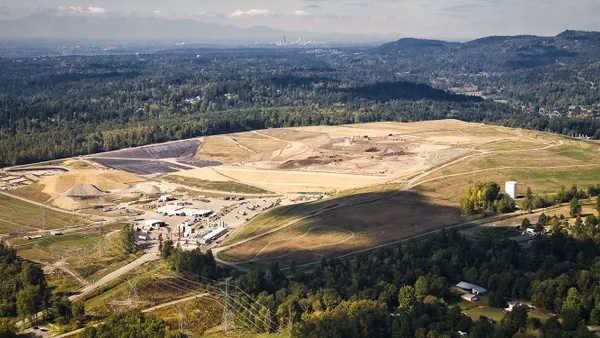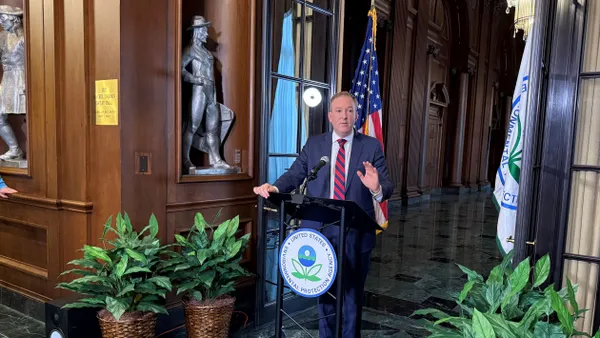UPDATE: June 6, 2019: The Osceola County Board of Commissioners has unanimously approved a resolution to perform independent groundwater testing at the JED Landfill following public protest against coal ash dumping at the site, as reported by Osceola News-Gazette. According to Danielle Slaterpryce, the county's public works director, engineering firm Jones Edmunds and Associates will likely perform the work due to its lack of existing ties or conflicts of interest with Waste Connections. Up to $200,000 have been set aside for initial site inspections as well as additional ongoing monitoring and sampling.
Dive Brief:
- After receiving county approval last month, Waste Connections began transferring coal from Puerto Rico to its JED Landfill near St. Cloud, Florida. The company has said it would accept up to 200,000 tons of coal ash by the end of 2019, according to the Osceola News-Gazette.
- Now, Osceola County seems to have walked back its approval. Following public outcry, commissioners issued a letter on May 14 asking Waste Connections to stop importing coal ash, citing concerns "with the presence of toxins in the ash and the potential of both environmental damage and human illness."
- Waste Connections has since promised to end shipments from its Puerto Rico contract starting Oct. 1. The news came out hours after highway patrollers cited company trucks for weight violations while en route for the JED Landfill, as reported by the News-Gazette.
Dive Insight:
Waste Connections began transferring coal ash in early April from the AES Puerto Rico power plant to its JED Landfill in St. Cloud. The contract required approval from the Osceola County Commission, which voted in favor on April 1. JED receives about 1.8 million tons of waste each year, and Puerto Rico's coal ash could make up 10% of its stream if landfill operators accept the full 200,000 tons. Osceola County earns $2 per ton of coal ash disposed at the site.
News of the deal broke on May 3. County residents immediately began voicing their concerns on social media, in protests and during public meetings. This prompted the county's May 14 letter, though a subsequent May 16 statement emphasized that the Florida Department of Environmental Protection (DEP) has ultimate authority over the landfill and noted that Puerto Rico is still in need of assistance.
A week later, Waste Connections Division Vice President Damien Ribar issued a letter saying it couldn't break a "binding agreement" to accept the material, but promised to end shipments from Puerto Rico by Oct. 1. It isn't clear how definitive this promise will be, since the company has reserved the right to change its mind. According to a previously issued fact sheet, the JED Landfill had received 44,000 tons of the material as of May 13.
While Waste Connections claims coal ash is not toxic, the U.S. EPA notes the material contains contaminants such as mercury, arsenic and other heavy metals. The company claims it has thoroughly tested the Puerto Rico waste and that levels of arsenic, barium, cadmium, chromium, lead, mercury, selenium and silver are below "relevant regulatory thresholds."
Florida DEP has permitted coal ash disposal at the JED Landfill since the facility opened in the early 2000s, but it isn't clear whether or not Waste Connections has accepted the material in the past. Requests for comment from Ribar were not returned.
In 2017, Puerto Rico Gov. Ricardo Rosselló signed a law banning coal ash disposal in the U.S. territory, although the waste can still be used in construction materials such as concrete and wallboard. Virginia-based AES Corporation, which operates the only coal-fired power plant in Puerto Rico, reported a 430,000-ton stockpile of the material in 2017 — the same year Hurricane Maria devastated the island.
Coal ash is the byproduct of burning coal (typically for energy production). It is also one of the largest industrial waste streams in the U.S. — more than 100 million tons of the material are produced annually, according to the American Coal Ash Association. While more than 64% of the nation's coal ash is recycled, 40 million tons still end up in landfills and ash ponds each year. Nearly every coal plant in the country has contaminated soil and groundwater as a result of the waste, based on utilities' own reporting.













